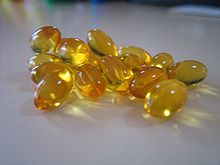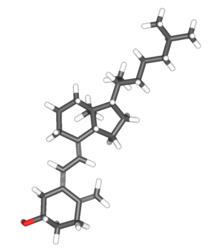- Cod liver oil
-
 Cod liver oil in gelatin capsules
Cod liver oil in gelatin capsules
 Cholecalciferol (Vitamin D3)
Cholecalciferol (Vitamin D3)
- This article is about the fish extract; for the traditional Newfoundland song, see "Cod Liver Oil (song)".
Cod liver oil is a nutritional supplement derived from liver of cod fish. It has high levels of the omega-3 fatty acids, EPA and DHA, and very high levels of vitamin A and vitamin D. It is widely taken to ease the symptoms of arthritis and for other health benefits. It was once commonly given to children, because the high levels of vitamin D in cod liver oil have been shown to prevent rickets and other symptoms of vitamin D deficiency.[1]
Contents
Manufacture
Cod liver oil was traditionally manufactured by filling a wooden barrel with fresh cod livers and seawater and allowing the mixture to ferment for up to a year before removing the oil.[2][3] Modern cod liver oil is made by cooking the whole cod body tissues of fatty fish during the manufacture of fish meal.
Therapeutic uses
Cod liver oil is widely taken to ease the pain and joint stiffness associated with arthritis,[4]. It may have a positive effect on heart,[5][6] bone,[7] as well as helping to repair wounded skin,[8] hair, and nails.
Cod liver oil and fish oil are similar, but cod liver oil has much higher levels of vitamins A and D. In fact, levels of vitamin A are usually high enough to reach toxic levels when consumed daily.[citation needed]
Cod liver oil may be an effective complementary measure for long-term treatment of multiple sclerosis.[9]
Use of cod liver oil during pregnancy is associated with lower risk of Type I diabetes in the offspring.[10] This effect was found only in mothers taking cod liver oil, not in mothers taking multivitamin supplements. Cod liver oil taken by nursing mothers improves the breast milk by increasing the amount of fatty acids, which promotes brain development, and the amount of vitamin A, which helps prevent infections, but the level of vitamin D is unchanged.
A Norwegian study of more than 68,000 women reported that female cancer patients who took daily cod-liver oil supplements had significantly reduced mortality (25% for all cancers, 45% for lung cancer) compared to women who did not take such supplements.[11][12]
Adverse effects
Because cod liver oil has a very high level of vitamin A, it is possible to exceed the Recommended Dietary Allowance (RDA) of vitamin A.[citation needed] Vitamin A accumulates in body fat, and can reach harmful levels sufficient to cause hypervitaminosis A.[13] Pregnant women may want to consider consulting a doctor when taking cod liver oil because of the high amount of natural forms of vitamin A such as retinol. High doses of synthetic vitamin A (retinoids) have been shown to cause birth defects.[14]
The risks of hypervitaminosis and of exposure to environmental toxins such as mercury, polychlorinated biphenyls (PCBs), dioxins , and other contaminants, are reduced when purification processes are applied to produce refined fish-oil products, which consequently contain raised levels of omega-3 fatty acids, such as EPA and DHA.[15]
A high intake of cod liver oil by pregnant women is associated with a nearly fivefold increased risk of gestational hypertension,[16] although this study did not control for mercury, which can be present in harmful amounts in fish[15] and which is another cause of hypertension.[17]
Some urge caution when taking cod liver oil and other fish-based supplements since they may contain elevated levels of toxins such as mercury and PCBs found in fish.[15] Some supplement companies regularly test cod liver oil for purity. Consumerlab.com tested 44 fish and cod liver oil supplements and found that all were free of detectable levels of mercury.[18]
Other uses
In Newfoundland, cod liver oil was sometimes used as the liquid base for traditional red ochre paint, the coating of choice for use on outbuildings and work buildings associated with the cod fishery.
See also
- Vitamin A overdose
- Shark liver oil
- Haliver oil (from halibut; potent source of vitamin A)
References
- ^ Rajakumar, K. Vitamin D, Cod-Liver Oil, Sunlight, and Rickets: A Historical Perspective. 2003. Pediatrics 112(2):132-135.
- ^ [1]
- ^ [2]
- ^ Gruenwald J, Graubaum HJ, Harde A. Effect of cod liver oil on symptoms of rheumatoid arthritis. 2002. Adv Ther 19:101-107. PMID 12069368
- ^ Knapp, HR, et al. (1987). "The Effect of Cod liver oil on the Development of Atherosclerosis in an Animal Model.". Proceedings of the AOCS: pp. 35–40.
- ^ von Schacky, C. (2000). "n-3 Fatty acids and the prevention of coronary atherosclerosis". Am J Clin Nutr 71 ((1 Suppl)): 224S–7S. PMID 10617975.
- ^ Akpede, GO, et al.; Omotara, B.A.; Ambe, J.P. (1999). "Rickets and deprivation: a Nigerian study.". J R.Soc.Health 119 (4): 216–22. doi:10.1177/146642409911900403.
- ^ Terkelsen, LH, et al. (2000). "Topical application of cod liver oil ointment accelerates wound healing: an experimental study in wounds in the ears of hairless mice.". J Plast. Reconstr. Surg. 34 (1): 15–20. doi:10.1080/02844310050160123.
- ^ Swank, Roy L., and Barbara Brewer Duggan. The Multiple Sclerosis Diet Book: A Low-Fat Diet for The Treatment of MS. Doubleday, 1987.
- ^ Stene LC, Ulriksen J, Magnus P, et al. Use of cod liver oil during pregnancy associated with lower risk of Type I diabetes in the offspring. 2000. Diabetologia 43:1093-1098. DOI: 10.1007/s001250051499 PMID 11043854 full-text (free)
- ^ Lund, Eiliv; Vanessa Dumeaux, Tonje Braaten, Anette Hjartåker, Dagrun Engeset, Guri Skeie, Merethe Kumle (6 June 2007). "Cohort Profile: The Norwegian Women and Cancer Study—NOWAC—Kvinner og kreft". International Journal of Epidemiology (Oxford University Press) 2008 (37(1)): 36–41. doi:10.1093/ije/dym137. PMID 17644530. http://ije.oxfordjournals.org/cgi/content/full/37/1/36. Retrieved 12 October 2007.
- ^ Skeie, G; Braaten T, Hjarta A, Brustad M, Lund E.. "Cod liver oil, other dietary supplements and survival among cancer patients with solid tumors.". Int J Cancer 2009 125: 1155–60.
- ^ Paul Lips (2003-05-08). "Hypervitaminosis A and fractures". N Engl J Med 348 (4): 1927–1928. doi:10.1056/NEJMe020167. PMID 12540650. http://content.nejm.org/cgi/content/short/348/4/347. Retrieved 2008-03-06.
- ^ Myhre AM, Carlsen MH, Bøhn SK, Wold HL, Laake P, Blomhoff R (December 2003). "Water-miscible, emulsified, and solid forms of retinol supplements are more toxic than oil-based preparations". Am. J. Clin. Nutr. 78 (6): 1152–9. PMID 14668278. http://www.ajcn.org/cgi/pmidlookup?view=long&pmid=14668278.
- ^ a b c Bays H E (2007-03-19). "Safety Considerations with Omega-3 Fatty Acid Therapy". The American Journal of Cardiology. 99 (Supplement 1) (6): S35–S43. doi:10.1016/j.amjcard.2006.11.020. PMID 17368277.
- ^ Olafsdottir AS, Skuladottir GV, Thorsdottir I, et al. Relationship between high consumption of marine fatty acids in early pregnancy and hypertensive disorders in pregnancy. 2006. BJOG 113:301-309. DOI: 10.1111/j.1471-0528.2006.00826.x PMID 16487202
- ^ Horowitz Y, Greenberg D, Ling G, Lifshitz M. Acrodynia: a case report of two siblings. Arch Dis Child 2002; 86: 453. PMID 12023189
- ^ ConsumerLab.com - Omega-3 Fatty Acids (EPA and DHA) from Fish/Marine Oils review
Categories:- Dietary supplements
- Animal fats
- Fish products
Wikimedia Foundation. 2010.
